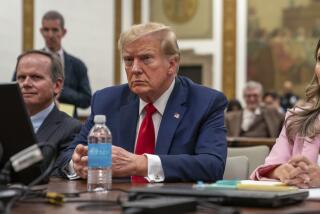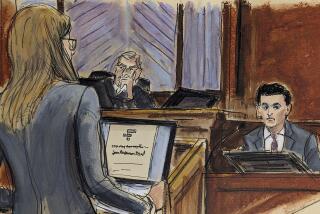Gates Takes Stand for Microsoft
- Share via
WASHINGTON — Trying to shed his image as ruthless and aloof, a smiling and confident Bill Gates strode into a federal courtroom here Monday to fend off tough antitrust punishment and repudiate Microsoft’s reputation as a business bully.
The software giant’s chairman, the world’s richest man, took the witness stand for the first time in the landmark antitrust case and warned that punishment sought by nine states suing his company would cripple Microsoft and hurt the entire computer industry.
For the record:
12:00 a.m. April 24, 2002 FOR THE RECORD
Los Angeles Times Wednesday April 24, 2002 Home Edition Main News Part A Page 2 A2 Desk 2 inches; 43 words Type of Material: Correction
Microsoft trial--A story in Section A on Tuesday incorrectly stated that the nine states suing Microsoft Corp. want the software company to make public the source code for its Windows operating system. The states want Microsoft to make portions of Windows more open to changes by other software developers.
Accompanied to court by his wife, Melinda French Gates, and a small security detail, the software mogul was by turns cheerful, confident and testy on the witness stand before a packed courtroom. The appearance of the brilliant but volatile Gates was considered a risky legal maneuver, but observers said it seemed to pay off.
Appearing as Microsoft’s seventh witness, Gates, 46, sparred with states lawyer Steve Kuney, who tried to show that Gates exaggerated the potential effect of punishment being sought by the District of Columbia, California and eight other states suing Microsoft for antitrust violations.
But Gates kept his composure through more than three hours of tough cross-examination. More important, presiding U.S. District Judge Colleen Kollar-Kotelly appeared to pay close attention to the software executive, taking frequent notes and turning to look directly at Gates while he testified.
‘The End of Innovation’
Under cross-examination by Kuney, Gates said the states’ proposed remedies would “mean the end of innovation and the elimination of most employees at Microsoft.” Asked by Kuney if he understood the seriousness of the consequences of the government’s proposed sanctions on his company, Gates said he viewed the trial and its outcome “as a significant situation, certainly one that could have a significant impact on the company,” and added that his company had ceased the anti-competitive conduct that it was found guilty of two years ago.
Gates’ courtroom appearance supplemented a 156-page written submission in which the company, under his name, assailed the proposed remedies as a straitjacket that would destroy the utility of Windows, undermine Microsoft’s corporate viability and stifle innovation across a wide spectrum of software development.
The states refused to sign on to a settlement between Microsoft and the Justice Department last fall. Among other penalties, the states want Microsoft to make public the millions of lines of “source code” that power Windows.
Proposals like that, according to Gates, “would turn back the clock on Windows development by about 10 years and effectively freeze it there.” Competitors, by contrast, would have the unfettered right “to add new cutting-edge features to their products.” The “practical effect,” Gates’ statement said, “would be to cripple Microsoft as a technology company.”
Critics of the company said that much of the written testimony repeated arguments that Microsoft had made unsuccessfully at earlier stages of the trial. “Microsoft’s strategy is to re-litigate the parts of the case they have already lost,” said Roger G. Noll, professor of public policy at Stanford’s graduate school of business.
Noll also dismissed Gates’ contention that some of the states’ proposals would permanently undermine the usefulness of Windows.
“The issue,” Noll said, “is whether it’s really going to reduce innovation in all software markets if you don’t let Microsoft innovate as it wants to.”
By day’s end, backslapping Microsoft lawyers appeared jubilant that their calculated risk to put Gates on the witness stand did not backfire.
“I think he made his case well,” said one Microsoft official. “He showed he was more familiar with the states’ proposal than they were.”
Armed with what seemed like an encyclopedic memory of the states’ proposals, Gates battled politely with his questioner down to the tiniest points. At one point, he argued over the word “interoperate.”
Howard University law professor Andrew Gavil said the Microsoft chairman had succeeded in presenting a “kinder and gentler Bill than was present in the first trial.”
Gates “didn’t lose his cool,” added Robert H. Lande, a University of Baltimore law professor, who has been sympathetic to the states’ antitrust case. “This is a real departure from the Bill Gates we usually see.”
Gates to Continue Testimony Today
Gates will return to the witness stand to resume testifying today. And it remains to be seen whether he will fully overcome the damaging effects of his 1998 videotaped deposition in which he appeared aloof, forgetful and defensive.
In that video, Gates slouched in a chair and repeatedly said he could not recall key corporate events. But government lawyers contradicted the claims at the time by introducing incriminating e-mails and other documents that showed that Gates had direct knowledge of many of the company’s efforts to crush business rivals.
Microsoft lawyers never indicated why they did not call Gates to the witness stand during the antitrust trial with the U.S. Justice Department that began in October 1998. But Gates’ absence at that proceeding and his performance in his videotaped deposition riled U.S. District Judge Thomas Penfield Jackson, who--after ordering a breakup of Microsoft--likened Gates to Napoleon.
In June, the U.S. Court of Appeals overturned Jackson’s breakup order but upheld his ruling that Microsoft used its flagship Windows software to illegally maintain a monopoly in personal computer operating systems. In November, the company reached an out-of-court settlement with the Justice Department.
Microsoft stock closed down $1.61 at $55.59 in Nasdaq trading. Gates is worth $35.85 billion.
*
Reuters was used in compiling this report.






